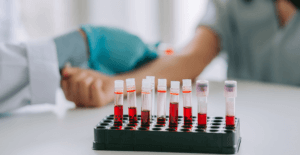New data has found high rates of lasting “brain fog” or cognitive dysfunction to average close to 8 months after patients have been diagnosed and treated for Covid-19.
The study of 740 people with a mean age of 49 years – published as a research letter in Jama Network Open – was carried out in the United States and included those treated in outpatient environments as well as people admitted to hospital or treated at A&E departments. All participants in the study did not have any previous issues with memory or cognitive problems.
In this cross-sectional study, researchers analysed data from April 2020 to May 2021, which they adjusted for race, ethnicity, smoker or non-smoker status, body mass index, comorbidities and any previous or existing depression.
One of the co-authors of the study, Jacqueline H. Becker, PhD, Division of General Internal Medicine, Icahn School of Medicine at Mount Sinai, New York City noted that this study has implications for younger people, as well as older populations who are known to be more susceptible to cognitive impairment.
The paper suggests that there are long-term cognitive repercussions from Covid-19, irrespective and indiscriminate of disease severity, that may impact people across various age groups.
Most common impairments
The study found some of the most common impairments to be:
- Memory encoding (the act of getting information into our memory system through automatic or effortful processing) -> 24%
- Memory recall -> 23%
- Category, or letter, fluency (ability to produce as many unique words as possible within a semantic category tested by listing as many animals as possible in a minute, for example) -> 20%
- Reported deficits in processing speed -> 18%
- Executive functioning (working memory, flexible thinking, and self-control) -> 16%
- Phonemic fluency (sum of correct, non-repeated words that an individual produced in the N and A letter trials) -> 15%
Serious impairments
More broadly, for many people across the world, long COVID is associated with serious neurological and neurocognitive impairments, a phenomenon sometimes also referred to as neuro-COVID.
“Pointy orange things, and of course, they’re carrots. I was just struggling to search for the names of things,” said Dr Kerry Smith, a UK family doctor, referring to her post-Covid symptoms after she contracted the virus from a patient who had returned from Wuhan, China who presented with a fever and persistent cough.
As the COVID-19 pandemic continues to progress, there is increased awareness that close to 1 in 3 who tested positive for COVID-19 and were usually not admitted to hospital for treatment, commonly referred to as long COVID, do not recover fully by 3 months.
An international study of people with long COVID documented 203 different symptoms across 10 body systems with more than 88% of the 3,762 people who completed the online survey reporting memory problems and cognitive dysfunction, making these the “most persistent and pervasive symptoms in this cohort, equally common across all age groups.”
Two-thirds (65%) reported experiencing symptoms for 6 months with cognitive dysfunction one of the top three most debilitating symptoms, alongside fatigue and breathlessness. Brain fog is the most common symptom described by people with cognitive dysfunction following COVID-19.
If you would like more advice on alleviating long COVID and improving your symptoms, we are here for you.

















2 responses
My wife and I were infected March 20 and have struggled with Long Covid since.It’s only now my wife had improved a lot.However she occasionally still has days with bad brain fog,low energy(post exertinal malaise and low mood/motivation and sometimes bad guy symptoms/loose stools and or some discomfort.
What can you do to help?
Thanks
John
Hello John. Sorry to hear how much COVID has impacted you both – it really can be a nasty virus, even in so-called “mild” cases. We recommend a review with our head doctor Dr Enam Abood who has been supporting people with long COVID symptoms. There are a range of lifestyle and dietary changes and other interventions which can help as well as supplements. Please do give us a call on 020 7323 1023 if you’d like to book an appointment.